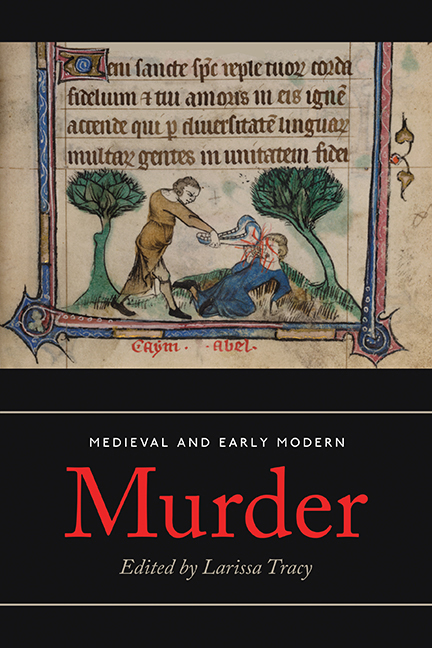Book contents
- Frontmatter
- Contents
- List of Illustrations and Tables
- Acknowledgements
- Contributors
- List of Abbreviations
- Introduction: Murder Most Foul
- I Murder on Trial: Justice, Law and Society
- II The Public Hermeneutics of Murder: Interpretation and Context
- III Murder in the Community: Gender, Youth And Family
- 13 Negotiating Murder in the Historiae of Gregory of Tours
- 14 Poisoning, Killing and Murder in the Edictus Rothari
- 15 Murder, Foul and Fair, in Shota Rustaveli's The Man in the Panther Skin
- 16 A Multiple Poisoning in the City of Valencia: Sanxo Calbó's Crime (1442)
- 17 A Case of Mariticide in Late Medieval France
- 18 Monstrous Un-Making: Maternal Infanticide and Female Agency in Early Modern England
- 19 Imps of Hell: Young People, Murder and the Early English Press
- Conclusion
- Select Bibliography
- Index
17 - A Case of Mariticide in Late Medieval France
from III - Murder in the Community: Gender, Youth And Family
Published online by Cambridge University Press: 05 July 2018
- Frontmatter
- Contents
- List of Illustrations and Tables
- Acknowledgements
- Contributors
- List of Abbreviations
- Introduction: Murder Most Foul
- I Murder on Trial: Justice, Law and Society
- II The Public Hermeneutics of Murder: Interpretation and Context
- III Murder in the Community: Gender, Youth And Family
- 13 Negotiating Murder in the Historiae of Gregory of Tours
- 14 Poisoning, Killing and Murder in the Edictus Rothari
- 15 Murder, Foul and Fair, in Shota Rustaveli's The Man in the Panther Skin
- 16 A Multiple Poisoning in the City of Valencia: Sanxo Calbó's Crime (1442)
- 17 A Case of Mariticide in Late Medieval France
- 18 Monstrous Un-Making: Maternal Infanticide and Female Agency in Early Modern England
- 19 Imps of Hell: Young People, Murder and the Early English Press
- Conclusion
- Select Bibliography
- Index
Summary
TUCKED INSIDE THE ARCHIVES of the southern French city of Toulouse is the story of Clare de Portet. The events surrounding this woman provide a unique opportunity to consider a nuanced connection between gender, murder and the spectacle of public executions in the fifteenth century. Preserved in a jurisdictional dispute from 1428, it is impossible to know with certainty if the case survives because of sheer happenstance, or if contemporaries recognised it as something exceptional and important. On 28 May that year, the royal seneschal of Toulouse found Clare, from the nearby town of Portet, guilty of adultery with Bertrandus Savari, a soldier working as a sailor on the local Garonne river during a lull in war. The two were also deemed culpable of killing her husband, whose dead body they hid under the staircase of her house. For these crimes, the seneschal condemned her to run the city streets of Toulouse as a ‘walk of shame’, to forfeit all of her goods to the court, and to be decapitated au talhador [at the chopping block] before the city's Royal Treasury. Afterwards, the seneschal ordered her body to be suspended from the city's gallows while her head was to be taken to Portet and displayed on a pike: ‘Qui ainsi fera ainsi périra’ [And thus she shall perish]. On the determined day, however, the execution did not go off smoothly. Clare ran the town and authorities presumably confiscated her possessions, but after the seneschal's officers loaded her into the executioner's cart and started to wheel her to the site of her beheading, a group of municipal administrators (known as capitols) and their sergeants burst through the crowd of spectators and physically stopped the vehicle. This was not an act of chivalry or benevolence; instead, the civic officials insisted that they (and not the seneschal) should have the right to execute her for the murder. After hours of intense public confrontation between the royal and local officials, the result was a four-year jurisdictional battle over who had the right to decapitate this woman for the betrayal and death of her husband.
The archival records of this case raise a number of fundamental questions about the particularity of this specific crime and execution.
- Type
- Chapter
- Information
- Medieval and Early Modern MurderLegal, Literary and Historical Contexts, pp. 395 - 416Publisher: Boydell & BrewerPrint publication year: 2018



